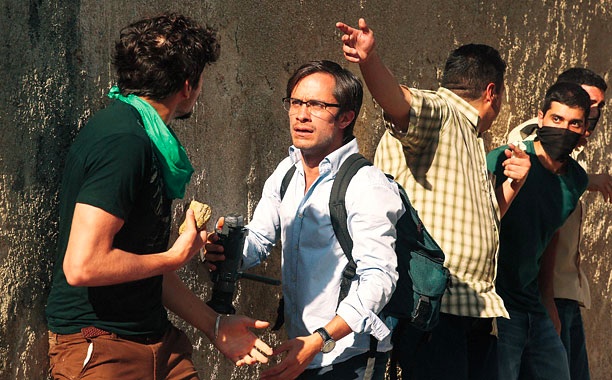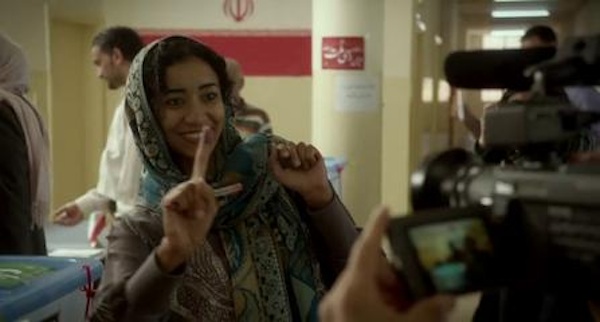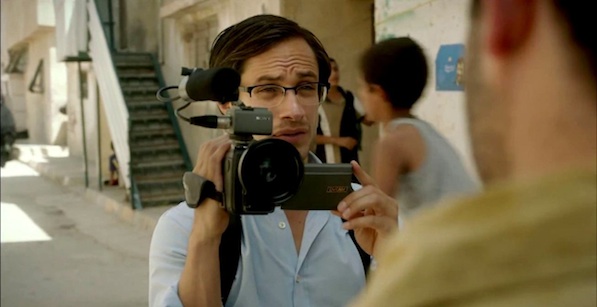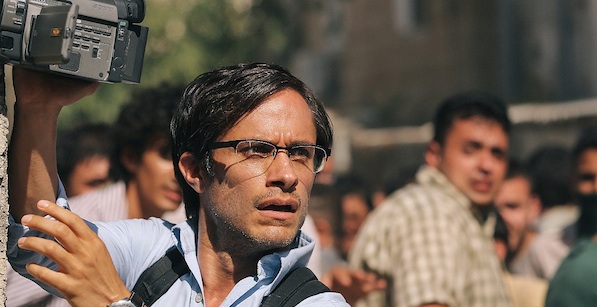[Editor’s note: the following conversation is a roundtable interview conducted by journalists Sam Fragoso, Marco Cerritos, Zaki Hasan and Josh Rotter.]
The announcement that Jon Stewart was taking the summer of 2013 off from The Daily Show to make his directorial debut left us stranded in a terrifying alternative universe—one without Stewart poking fun and waxing satirical from behind his oblong desk. We were without the one man on television who consistently tells it like it is, four days a week.
In the intervening months John Oliver aptly filled in while Stewart embarked on his mission in Jordan to make a film about Newsweek journalist Maziar Bahari (played by Gael Garcia Bernal), who had been incarcerated by the Iranian government on eleven counts of espionage. Bahari’s imprisonment occurred, in part, because of an appearance he made on The Daily Show that jokingly described him as a spy. Unfortunately, the authoritarian government in Iran failed to see the humor in the sketch and interrogated Bahari for 118 days. What followed was the type of physical and emotional abuse that Bahari would later detail in his New York Times best-selling memoir, They Came For Me: A Family’s Story of Love, Captivity, and Survival.
Indeed, Rosewater is the byproduct of a fatal misunderstanding. A bit gone horrifically awry. In San Francisco promoting their admirable collaboration, Stewart and Bahari were candid in detailing how arduous an undertaking this project was, the complexity of social media in the twenty-first century and the battle to maintain creative control amid the money-hungry studio system.
I had read earlier that your original vision for this film was a little bit harsher and you had to pull back due to financing.
Jon Stewart: I don’t know about harsher. Originally, when we spoke a bit, there was this idea of it being in Farsi. But certainly not darker. Having a different tint to it perhaps. Maziar said something like, “Don’t you want people to see it?” That ended up pushing it in a different direction.
Having said that, how delicate of a line did you have to walk between what you wanted to do versus what would be more commercially acceptable?
Stewart: It’s not so much that it was commercially acceptable, it’s more figuring out the best way to tell this story with integrity. The truth is, and you may not know this, I’m not fluent in that language.
Are you sure?
Stewart: (Laughs.) The height of presumption in hubris, there are great Iranian filmmakers to make that film. This was going to be a reflection of the source material, which was Maziar’s book. And this was the best iteration of telling that story that I could accomplish.

In the press notes you mention how you felt a certain amount of guilt—a motivating factor in doing this story. What was going through your mind when you had heard what happened to Maziar?
Stewart: We joke about that to some extent. It was more concern than guilt. Obviously, and I hate to spoiler alert this, but generally we’re not actually in the places we say we are at The Daily Show. It’s a picture that we’re standing in front of, and I probably shouldn’t be giving that away. We’re not actually traveling to these places. So this is one of the first times we had ever done that, and to have all the individuals we interviewed be arrested within the context of a much larger authoritarian crackdown in a culture. It’s not as if we were unaware.
We did not think, ‘Oh my god, three people we interviewed were arrested and no one else.”‘Correlation equals causation, you know? We felt a concern that something we might be doing may be damaging their chances of getting out. Or was there something on the flipside that we could do to help them get out. But everyone was urging us to continue talking about what had happen during that time and keep trying to bring attention to it. And that’s one of the reasons Maziar was so keen on getting the story out. There are so many people now who are in this same situation and you want to publicize there plight more than bury it.

Do you two find social media, especially when it comes to politics, to be a benefit or a burden?
Maziar Bahari: It’s definitely not a burden. I cannot imagine it to be a burden. Some people have some issues with Facebook and Twitter … that intelligence agencies can get people’s information through these services. But that’s not an issue. They can do that through other means as well. I think social media is expediting these movements. These social, non-violent resistance moments all around the world. Not only Iran. It maybe actually started in Iran—the first time social media played a role in a movement. Since then we have seen it in the Arab Spring and in different countries: Tunisia, Egypt, Syria, Libya, Hong Kong, Ukraine. Because social media is about sharing information, sharing data. And sharing information and sharing data is a democratizing factor, and for authoritarians it’s a scary phenomenon. They are scared of the free-flow of information. Social media … we’re just seeing the beginning of it.
Stewart: I think it’s also important to try an view it through its strengths and its limitations. It’s an excellent tool for people to organize, to gather, to spread information. That being said, it’s limited in its efficacy in terms of building the types of lasting, civic institutions and structures that need to be in place for those information technologies to be effective. It’s not just about getting people out into the street. Then you have to have something that’s going to fill that power vacuum or whatever is that you want to use as your reform.
Bahari: It’s a medium. You can’t expect social media to bring you electricity or to pick up your garbage. It’s just a medium.
And it’s something you’d rather live with than without.
Stewart: But that’s like saying you’d rather live in a world without phones. People always say about television that there are all these different platforms and you’re like, ‘Yeah, but the important thing is there’s always going to be content.’ And the reason I think social media is effective within authoritarian regimes is because they’re built to stop more conventional means. So what social media allowed for was agility. It allowed for a spontaneity that the regimes could not catch up to. It leveled the playing field, to some extent, from the powerful to those that were seeking to get out on the street.
On any given episode of The Daily Show it’s clear to spot your influences: Lenny Bruce, Woody Allen, Jerry Seinfeld. Were you looking to or thinking of a certain director while making Rosewater?
Stewart: The truth is I was most influenced by Maziar and his story. As far as the visualizations of it, the intention was to create a pallet that the story could live in without the pallet itself drawing your eye. In other words, the prison was not to be a dungeon, even though I think the expectations from many Westerners would be that he was underground with no lights and rats running around.
Certainly no dancing.
Stewart: No dancing. But every prison is not that. It’s a bureaucratic institution much like hospitals. They clean the floors. You don’t view it as Dante’s Inferno. It’s a bureaucracy.
Bahari: The food was much better than most airlines.

Hitting on that, you’ve been interviewing filmmakers and celebrities for years now. Subconsciously, did you want to step behind the camera, or did it just happen?
Stewart: It was a relatively organic process that grew out of our collaboration early on from the book in trying to produce the film, and not knowing our way around that process and not being so aware of how glacial it is and wanting this film to be seen in this century. We didn’t have any money. We had this great list of people that had won many awards but who were apparently ‘busy’ being ‘paid’ for other shit. This was a question, ultimately, of feeling like this is a very relevant and urgent issue and wanting it to be made and wanting to maintain a certain amount of creative control of the process. We both felt very strongly about the aspects of it and we didn’t want to relent that to a larger entity that may have a very different take on it. Like, ‘what if Maziar was actually a lesbian and wasn’t in a prison but was actually in a rodeo.’ You know, trying to make it more commercial.
Bahari: (Laughs.) I think it came out of a mutual trust. From the beginning I was a fan of The Daily Show, so I trust that image of Jon. When we got to know each other, I think it was mutual trust, working on the script together. Eventually Jon had a lot of emotional and time investment in the material. We did not want to hand it someone else who may ruin it.




